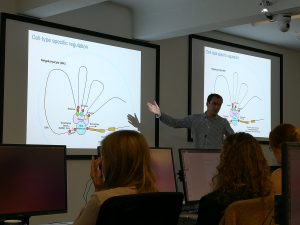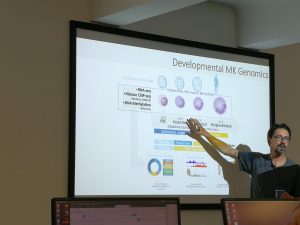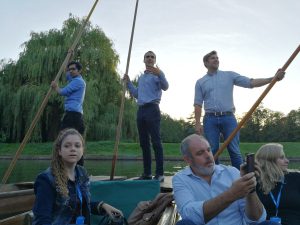Platelet Society members attend bioinformatics workshop.
Genomics Workshop
Cambridge, UK
17th – 19th September 2018
As scientists we are spoilt with the amount of data that we have available to understand biology and how this goes wrong in disease. The scale of the data is, however, enormous, and therefore understanding how to use it effectively is a challenge. A pertinent example of this is genomics data. Platelet biologist frequently don’t think about genomics data, because platelets don’t have a nucleus, and therefore do not have a genome. Platelets do inherit genetic information from megakaryocytes, the large cells found in the bone marrow that produce platelets, so genomics can tell is a great deal about how platelets are controlled, why sometimes they trigger thrombotic disease, and potentially also allow us to predict the risk of developing a platelet-related disorder. A Workshop in Bio-informatics was therefore held in Cambridge to train platelet biologists in important new skills to utilise genomics data in our studies, and to create a network to support research in this area.
The Workshop in Bioinformatics was a great opportunity to learn cutting-edge techniques for genomic analysis directly from researchers that are using and developing them.
The 3-day workshop included seminars and workshops on:
- Long read sequencing technologies
- Short read whole genome data: calling of variants
- Assigning function to the non-coding space
- Machine learning and AI to integrate genomic, transcriptomic and epigenomic data
- Protein–protein interactions: Pathways and Networks
We would like to thank the organisers and speakers for delivering an excellent programme and for inviting platelet researchers to attend.
Report by Alex Bye (Reading). Photos courtesy of Zoltan Nagy (Birmingham)



